Words MAXMILIAN WECHSLER
His Excellency Stanislav Opiela is nearing the end of his final assignment for the Slovak Republic. When he and his wife Wiera return home sometime this year, they will be missed by many good friends they’ve made in Thailand.
Ambassador Opiela is known as one of the most active and astute members of the Bangkok diplomatic corps (see CV), and colleagues and Thai officials alike are keen to hear his take on developments in international affairs. Though not a trained diplomat herself, the ambassador’s cheerful and elegant wife works long hours assisting him at the embassy and is a constant companion at the myriad social functions that go with the job. It seemed only fitting to interview both husband and wife, but for the sake of clarity their comments are presented separately.
Ambassador Opiela is known as one of the most active and astute members of the Bangkok diplomatic corps (see CV), and colleagues and Thai officials alike are keen to hear his take on developments in international affairs. Though not a trained diplomat herself, the ambassador’s cheerful and elegant wife works long hours assisting him at the embassy and is a constant companion at the myriad social functions that go with the job. It seemed only fitting to interview both husband and wife, but for the sake of clarity their comments are presented separately.
| Embassy and trade At the start of the interview the ambassador said candidly, “During the last four years in Thailand I have had some positive as well as negative experiences. The plan is always to achieve maximum success in the initiatives under taken by the embassy, but the reality doesn’t always correspond.” This honest and straightforward assessment was typical of the ambassador. “Our embassy is very small, with only two diplomats, myself included, and we cover four countries – Laos, Cambodia and Myanmar as well as Thailand. There are a lot of consular issues and my deputy is almost completely dedicated to them. Everything else is on me,” said Mr Opiela. “I have to follow what is going on in four countries, and this is not so easy because I don’t speak the local languages. My main sources are English-language newspapers and other publications. In Thailand, Cambodia and Myanmar there is pretty good information available, but in Laos there’s only one accessible English newspaper. Vientiane Times. I send reports back to my Ministry of Foreign Affairs (MFA), and this takes time. I include important developments in all four countries in my evaluation reports, and from time to time I receive instructions to supply information on specific developments.” The ambassador is tasked with promoting the interests of the Slovak Republic in Laos, Cambodia and Myanmar. |
However, as Thailand is undoubtedly Slovakia’s mostimportant partner in the region, this is where the primary focus of the embassy lies. “We are a young country. Relations with Thailand were established only after the creation of the Slovak Republic on January 1, 1993, following the peaceful dissolution of Czechoslovkia. We are trying to put Slovakia ‘on the map’ for Thais by broadening ties in the spheres economics, culture, people-to-people contacts and all manners of activity.
“As a diplomat, I know that you can’t expect big results in a day. Concrete results take time to achieve. My work has been mainly concentrated on introducing Slovakia to the Thai people and to Thai officials and institutions. I want to make sure they know our country exists in Europe, that we are a member of the EU and are relatively well developed country, and that we are becoming an important player in international affairs.
“Although Slovakia is a new country, we have a rich history and a high level of cultural development. So this is one area which I am promoting. Of course, initiatives for improved economic relations, especially trade, must also be given great importance.If you just look at overall trade volume between Slovakia and Thailand in 2018, the numbers aren’t bad at all – about 263 million euro (around 8.7 billion baht at current exchange rate for cash). But what’s bad for us is that Thailand’s exports to Slovakia totaled about 225 million euro or about 7.5 billion baht. We are trying out ways to balance out the trade exchange, but it is not so easy. For one thing, many of the most important companies in Slovakia are foreign owned. This is particularly true in the car production industry.
“Most people don’t know that Slovakia is the biggest producer of passenger cars per capita in the world. In 2019 we produced 1.1 million cars. The population of Slovakia is 5.3 million people, so that amounts to 202 cars per 1,000 citizens. The manufacture of cars represents about half of industrial production in Slovakia, and almost 14% of the GDP. Almost 50% of Slovakian exports are cars. But as Isaid, foreign companies control the plants that make the cars. Brands like Volkswagen, Peugeot-Citroën, KIA and Jaguar are the main producers of cars in Slovakia.
“There’s a positive trend in trade volume between our two countries. It is increasing every year. But I must stress that this doesn’t depend on the work of the embassy, but this more a result of activities our businessmen, traders and companies. Our companies are unfortunately not too strong or active which doesn’t apply to Thailand but to other Asian countries with the exclusion of China, India, Japan and Korea,” Mr Opiela stressed.
“There is a lot of untapped potential in terms of our economic relations. From time to time some Slovakian companies come here to explore the situation and try to do something to penetrate the Thai market on their own, but without Thai partners this is not easy.
“For example, one Slovakian company that owns a patent to a unique technology for the liquidation of used tires wants to bring this technology to Thailand and to build a plant to do it here. It is theoretically a simple technology, but it is very useful and environmentally friendly. After liquidation of the used tires you have no bad waste.
“So here we have something we can offer to the Thai market which is very useful and unique. However, the Slovakian company has been negotiating with a Thai company for three years, but until now nothing has happened. I understand that this is partly due to the distance between our countries and the fact that we don’t know each other very well. Thais are much more likely to trust German or Swiss technology, for example. But I firmly believe there’s a possibility for real and mutually beneficial economic progress in the near future.’’
“As a diplomat, I know that you can’t expect big results in a day. Concrete results take time to achieve. My work has been mainly concentrated on introducing Slovakia to the Thai people and to Thai officials and institutions. I want to make sure they know our country exists in Europe, that we are a member of the EU and are relatively well developed country, and that we are becoming an important player in international affairs.
“Although Slovakia is a new country, we have a rich history and a high level of cultural development. So this is one area which I am promoting. Of course, initiatives for improved economic relations, especially trade, must also be given great importance.If you just look at overall trade volume between Slovakia and Thailand in 2018, the numbers aren’t bad at all – about 263 million euro (around 8.7 billion baht at current exchange rate for cash). But what’s bad for us is that Thailand’s exports to Slovakia totaled about 225 million euro or about 7.5 billion baht. We are trying out ways to balance out the trade exchange, but it is not so easy. For one thing, many of the most important companies in Slovakia are foreign owned. This is particularly true in the car production industry.
“Most people don’t know that Slovakia is the biggest producer of passenger cars per capita in the world. In 2019 we produced 1.1 million cars. The population of Slovakia is 5.3 million people, so that amounts to 202 cars per 1,000 citizens. The manufacture of cars represents about half of industrial production in Slovakia, and almost 14% of the GDP. Almost 50% of Slovakian exports are cars. But as Isaid, foreign companies control the plants that make the cars. Brands like Volkswagen, Peugeot-Citroën, KIA and Jaguar are the main producers of cars in Slovakia.
“There’s a positive trend in trade volume between our two countries. It is increasing every year. But I must stress that this doesn’t depend on the work of the embassy, but this more a result of activities our businessmen, traders and companies. Our companies are unfortunately not too strong or active which doesn’t apply to Thailand but to other Asian countries with the exclusion of China, India, Japan and Korea,” Mr Opiela stressed.
“There is a lot of untapped potential in terms of our economic relations. From time to time some Slovakian companies come here to explore the situation and try to do something to penetrate the Thai market on their own, but without Thai partners this is not easy.
“For example, one Slovakian company that owns a patent to a unique technology for the liquidation of used tires wants to bring this technology to Thailand and to build a plant to do it here. It is theoretically a simple technology, but it is very useful and environmentally friendly. After liquidation of the used tires you have no bad waste.
“So here we have something we can offer to the Thai market which is very useful and unique. However, the Slovakian company has been negotiating with a Thai company for three years, but until now nothing has happened. I understand that this is partly due to the distance between our countries and the fact that we don’t know each other very well. Thais are much more likely to trust German or Swiss technology, for example. But I firmly believe there’s a possibility for real and mutually beneficial economic progress in the near future.’’
| Blossoming cultural cooperation Mr Opiela was pleased to reveal that bilateral cooperation in the cultural arena is showing a lot of promise. “Slovak folk groups are participating in different festivals in Thailand on a regular basis every year. We have started participating in film festivals here with other EU countries. I can say that the reaction of the Thai people to Slovak films has been very positive. There was a very good reception for a film shown in celebration of the 30th anniversary of the Velvet Revolution,” said the ambassador, referring to popular demonstrations led by students and dissidents from November 17 to December 29, 1989 that led to the remarkably smooth collapse of the one-party communist regime. Last month the world premiere of the opera ‘Helena Citrónová’, composed by Thai Maestro Somtow Sucharitkul, was presented at the Thailand Cultural Centre. “The strong-willed Helena Citrónová was a Jewish woman from Slovakia who would not give up her humanity in the horrors of the Auschwitz concentration camp,” explained the ambassador. “Everyone knows Thais enjoy showing off products made from Thai silk around the world. I’ve been very interested in local fashion events connected with Thai silk over the last four years, including Thai Silk International Fashion Week in November 2019. This was with the participation of foreign designers, who made dresses from Thai silk in their own countries. In Slovakia one designer made a dress for my wife. During the Gala on the closing night wives of ambassadors and female ambassadors presented the dresses on the catwalk,” said the ambassador. |
Mrs Opielová interjected: “The Gala is a different event, but connected to Fashion Week. It involves the same designers and Thai silk. The Gala is the final activity. It has become so popular that many male ambassadors participate. In November I made my modeling debut, wearing a dress made by a Thai designer.”
In a separate but related event, a Slovak designer received silk from Thailand to make around 12 dresses that were shown by Thai models at fashion shows in shopping malls in Thailand. The designer came here with the dresses, and during the events videos about Slovakia were shown on the podium. “This is a very good activity and good PR for Slovakia,” said the ambassador.
In a separate but related event, a Slovak designer received silk from Thailand to make around 12 dresses that were shown by Thai models at fashion shows in shopping malls in Thailand. The designer came here with the dresses, and during the events videos about Slovakia were shown on the podium. “This is a very good activity and good PR for Slovakia,” said the ambassador.
Ambassador’s thoughts on Thailand and retirement
“When I first came here I was generally surprised to find that Thailand is a rather developed country. I expected that only the capital would be developed, as in many underdeveloped countries. But in Thailand everywhere you go you see some kind of industry and various business activities. Outsiders’ impressions of the country tend to be very positive. Thailand is clean and well-organized and everything seems to work well. I was most surprised to learn how nice Thai people are. They are very calm, not nervous like in Europe. They don’t rush and they always have smiles on their faces. This is a very friendly country.
“We haven’t had all that many contacts with the Thai authorities because the embassy hasn’t staged so many activities, but all the contacts we’ve had have been very good, especially with people from the MFA. All the people we’ve met from different ministries, organizations and institutions, the private sector and NGOs at various social events have been very friendly and open and have shown an interest in meeting with us.
“After the very busy life in Bangkok, retirement will be difficult. I can’t image now what I am going to do every day
back home. Here we are busy from morning until night. I am a little bit worried how I will survive. There are not many possibilities for retired people in Slovakia. Nobody needs them. We are also somewhat in a bad situation because our three children, two sons and a daughter, live in Canada. We will, of course, sometimes visit them there.
“There’s no possibility of continuing to work for the MFA, or becoming involved in some political organization or working as a TV commentator. I know a lot about foreign policy, but by and large Slovak people don’t care too much about this. They prefer business, celebrity news and stupid TV shows. I don’t have any intention or dream to write a book or something like that. I suppose I will occupy myself with some sports activities, reading and travel, but what to do during the cold winter in Slovakia?”
“When I first came here I was generally surprised to find that Thailand is a rather developed country. I expected that only the capital would be developed, as in many underdeveloped countries. But in Thailand everywhere you go you see some kind of industry and various business activities. Outsiders’ impressions of the country tend to be very positive. Thailand is clean and well-organized and everything seems to work well. I was most surprised to learn how nice Thai people are. They are very calm, not nervous like in Europe. They don’t rush and they always have smiles on their faces. This is a very friendly country.
“We haven’t had all that many contacts with the Thai authorities because the embassy hasn’t staged so many activities, but all the contacts we’ve had have been very good, especially with people from the MFA. All the people we’ve met from different ministries, organizations and institutions, the private sector and NGOs at various social events have been very friendly and open and have shown an interest in meeting with us.
“After the very busy life in Bangkok, retirement will be difficult. I can’t image now what I am going to do every day
back home. Here we are busy from morning until night. I am a little bit worried how I will survive. There are not many possibilities for retired people in Slovakia. Nobody needs them. We are also somewhat in a bad situation because our three children, two sons and a daughter, live in Canada. We will, of course, sometimes visit them there.
“There’s no possibility of continuing to work for the MFA, or becoming involved in some political organization or working as a TV commentator. I know a lot about foreign policy, but by and large Slovak people don’t care too much about this. They prefer business, celebrity news and stupid TV shows. I don’t have any intention or dream to write a book or something like that. I suppose I will occupy myself with some sports activities, reading and travel, but what to do during the cold winter in Slovakia?”
Viera Opielová on Thailand and retirement
“Before we came to Thailand, I was little bit worried because we’d never being in Asia and I was told there are snakes everywhere, the weather is always hot and nothing is very special. Over the past four years I’ve found that this image is very wrong. Thailand is a beautiful country and I can tell you that we are very sad that we may have to leave this year. We will always have very good memories of this country. People in Thailand are very nice, usually smiling and very friendly. Bangkok has grown so much over the four years since we’ve been here. There are so many new high-rise buildings, and they are such beautiful and modern structures.”
Asked what she likes most about Thailand, Mrs Opielová answered with a smile: “It is very hard to say because most of the time I have been at the embassy working. But really, I especially like the people. We have taken the opportunity to take trips organized by the Thai MFA, Ministry of Tourism and Sports and other agencies and we have seen many beautiful places here. We visited Chiang Mai, Chiang Rai, Phuket and a number of other Thai provinces. Besides enjoying the beauty, it is a very good way to learn about the country.
“I prefer it a bit cooler, but generally the weather is nice here. I can swim almost every day, which you certainly can’t do in Slovakia. I like the social life in Bangkok. It’s great. We were assigned to the Slovak embassy in Ottawa in Canada, and there is no comparison. We are very happy with the diplomatic corps in Thailand. Nice people all around. We are lucky here, because it’s not such a friendly group in some other places.
“My husband and I agree that the most memorable time we experienced during the past four years was the passing of His Majesty King Rama IX. I’ve never seen such an outpouring of grief. We attended the funeral together with other diplomats. The coronation of His Majesty King Rama X was also quite memorable. We were present at some events. Another unforgettable event was meeting His Holiness Pope Francis during a mass at the National Stadium late last year.
“The people here are so nice, so friendly and so helpful. We’ve seen so many nice places and attended so many great social events like concerts and exhibitions. I have made many friends in Thailand from many walks in life.
“Before we came to Thailand, I was little bit worried because we’d never being in Asia and I was told there are snakes everywhere, the weather is always hot and nothing is very special. Over the past four years I’ve found that this image is very wrong. Thailand is a beautiful country and I can tell you that we are very sad that we may have to leave this year. We will always have very good memories of this country. People in Thailand are very nice, usually smiling and very friendly. Bangkok has grown so much over the four years since we’ve been here. There are so many new high-rise buildings, and they are such beautiful and modern structures.”
Asked what she likes most about Thailand, Mrs Opielová answered with a smile: “It is very hard to say because most of the time I have been at the embassy working. But really, I especially like the people. We have taken the opportunity to take trips organized by the Thai MFA, Ministry of Tourism and Sports and other agencies and we have seen many beautiful places here. We visited Chiang Mai, Chiang Rai, Phuket and a number of other Thai provinces. Besides enjoying the beauty, it is a very good way to learn about the country.
“I prefer it a bit cooler, but generally the weather is nice here. I can swim almost every day, which you certainly can’t do in Slovakia. I like the social life in Bangkok. It’s great. We were assigned to the Slovak embassy in Ottawa in Canada, and there is no comparison. We are very happy with the diplomatic corps in Thailand. Nice people all around. We are lucky here, because it’s not such a friendly group in some other places.
“My husband and I agree that the most memorable time we experienced during the past four years was the passing of His Majesty King Rama IX. I’ve never seen such an outpouring of grief. We attended the funeral together with other diplomats. The coronation of His Majesty King Rama X was also quite memorable. We were present at some events. Another unforgettable event was meeting His Holiness Pope Francis during a mass at the National Stadium late last year.
“The people here are so nice, so friendly and so helpful. We’ve seen so many nice places and attended so many great social events like concerts and exhibitions. I have made many friends in Thailand from many walks in life.
| What I also like about Bangkok is there are so many restaurants with any type of cuisine. It is very easy to take friends for lunch or dinner. I like cooking myself and do so almost every evening that we don’t go out. “I can say almost nothing bad about this country. I don’t know if I should say this, but I am not fond of Thai food because many dishes are too spicy for me. However, I do like Thai fruits. I am not fond of the traffic either, but for the most part we get around that by living close to the embassy. When we first came here and were looking for a place to stay, after we saw the traffic and how difficult it is to get around we decided it had to be close to the embassy. “We are very happy with our residence in a high-rise, only a 10-minute walk from the embassy at the YMCA Tower on Sathorn Road. We don’t always walk. It is very convenient to live close to your work, but when we are going to a reception or dinner in the evening it is very difficult because the traffic is always heavy. The lines of vehicles on Sathorn Road stretch a long way and the red lights are on for a long time. The motorcycles really add to the traffic chaos. They don’t follow traffic laws and they are everywhere, driving fast and zooming around our car. Many of them don’t watch out for people crossing the road. “We are expecting to be recalled back to Slovakia but we don’t know when. It could be very soon or maybe a little later. After our assignment ends we will return to Bratislava, the capital of Slovak Republic. |
We don’t know yet what we are going to do there and this is a little bit scary. Now it is very hectic and exciting for us in Thailand, and when we go back it will be only the two of us. Maybe we will start to fighting,” Mrs Opielová joked.
“But in a way, I am looking forward to going back home because I have been working very hard here and it is tiring at my age. Most of the time, I help at out in the consular section. It is an extremely busy section, really more than a full time job. It is time to relax.”
“But in a way, I am looking forward to going back home because I have been working very hard here and it is tiring at my age. Most of the time, I help at out in the consular section. It is an extremely busy section, really more than a full time job. It is time to relax.”
CV of H.E. Stanislav Opiela
Education
• 1971-1975: Moscow State Institute of International Relations.
• 1970-1971: University of Economics, Bratislava.
Work experience
• 2014-2015: Ministry of Foreign and European Affairs of the Slovak Republic, Director of the Office of the 1st Deputy Minister.
• 2012-2014: Ministry of Foreign and European Affairs of the Slovak Republic, Department of Americas, Senior Desk Officer.
• 2011-2012: National coordinator for Slovak Republic to the EU Strategy for Danube Region in Prime Minister Office.
• 2010-2011: Ministry of Foreign Affairs (MFA) of the Slovak Republic, UN Department, Senior Desk Officer.
• 2005-2010: Embassy of the Slovak Republic to Canada, Ambassador.
• 2002-2005: MFA of the Slovak Republic, Senior Desk Officer.
• 1999-2002: Embassy of the Slovak Republic to Canada, Deputy Head of the Embassy, Minister - Counselor.
• 1998-1999: MFA of the Slovak Republic, National coordinator of the Slovak Republic for Central European Initiative.
• 1997-1998: Embassy of the Slovak Republic to Canada, Charge d’Affaires a.i.
• 1995-1997: Embassy of the Slovak Republic to Canada, Deputy Head of the Embassy, Counselor.
• 1994-1995: MFA of the Slovak Republic, Department for European Integration, Acting and later Deputy Director.
• 1993-1994: Embassy of the Slovak Republic to Tunisia, Chargé d’Affaires, Counselor.
• 1975-1993: Federal MFA of the former Czech and Slovak Federal Republic, different position at the headquarters in Prague, including foreign postings in Congo (1984-1988) and in Tunisia (1990-1992).
Education
• 1971-1975: Moscow State Institute of International Relations.
• 1970-1971: University of Economics, Bratislava.
Work experience
• 2014-2015: Ministry of Foreign and European Affairs of the Slovak Republic, Director of the Office of the 1st Deputy Minister.
• 2012-2014: Ministry of Foreign and European Affairs of the Slovak Republic, Department of Americas, Senior Desk Officer.
• 2011-2012: National coordinator for Slovak Republic to the EU Strategy for Danube Region in Prime Minister Office.
• 2010-2011: Ministry of Foreign Affairs (MFA) of the Slovak Republic, UN Department, Senior Desk Officer.
• 2005-2010: Embassy of the Slovak Republic to Canada, Ambassador.
• 2002-2005: MFA of the Slovak Republic, Senior Desk Officer.
• 1999-2002: Embassy of the Slovak Republic to Canada, Deputy Head of the Embassy, Minister - Counselor.
• 1998-1999: MFA of the Slovak Republic, National coordinator of the Slovak Republic for Central European Initiative.
• 1997-1998: Embassy of the Slovak Republic to Canada, Charge d’Affaires a.i.
• 1995-1997: Embassy of the Slovak Republic to Canada, Deputy Head of the Embassy, Counselor.
• 1994-1995: MFA of the Slovak Republic, Department for European Integration, Acting and later Deputy Director.
• 1993-1994: Embassy of the Slovak Republic to Tunisia, Chargé d’Affaires, Counselor.
• 1975-1993: Federal MFA of the former Czech and Slovak Federal Republic, different position at the headquarters in Prague, including foreign postings in Congo (1984-1988) and in Tunisia (1990-1992).

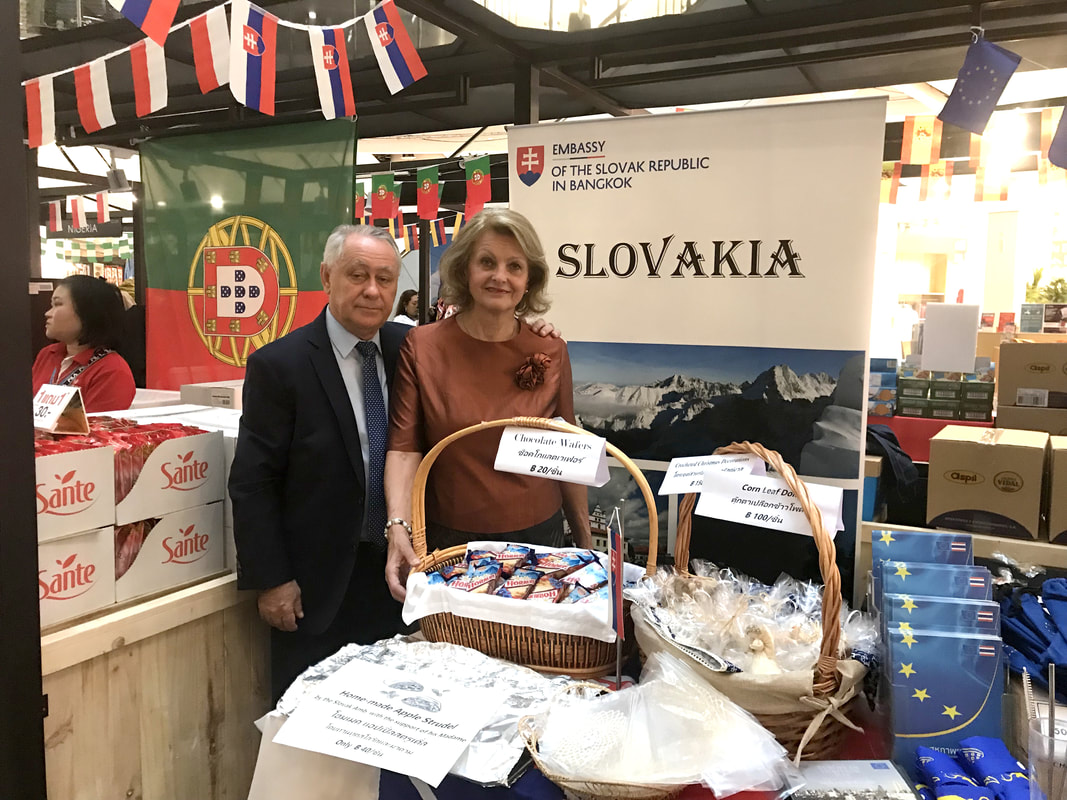
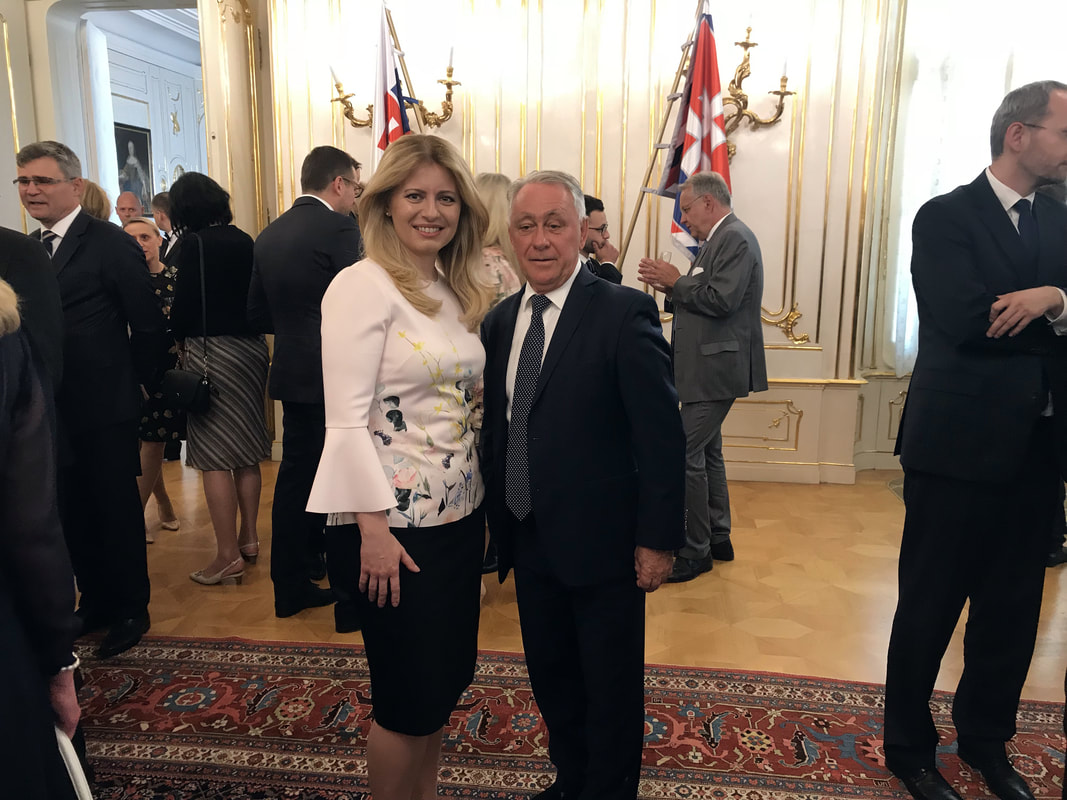
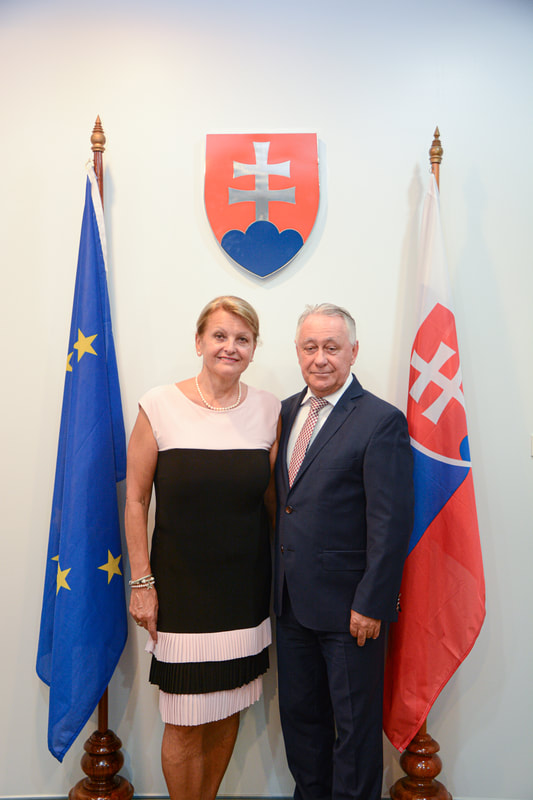
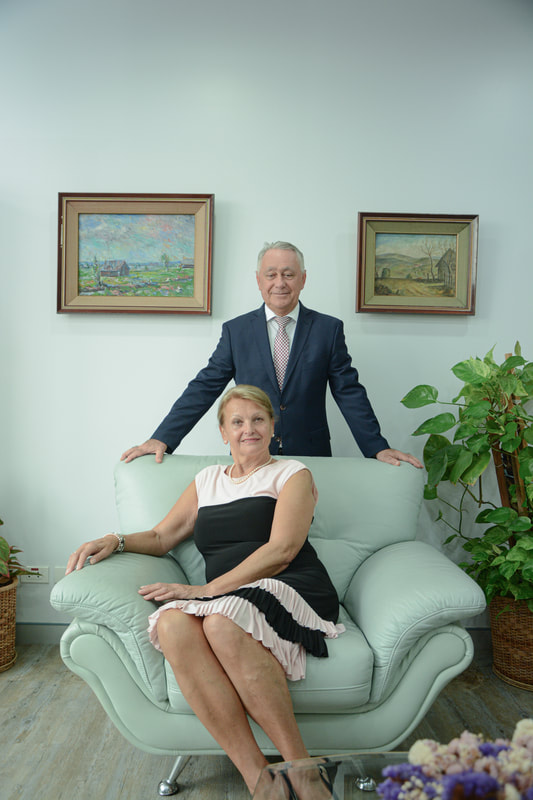
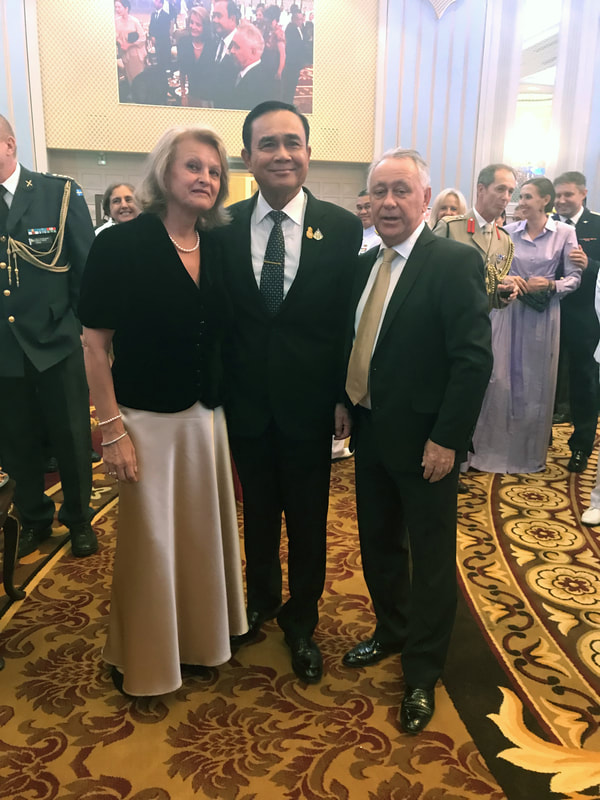
 RSS Feed
RSS Feed
















